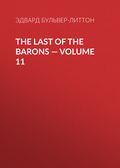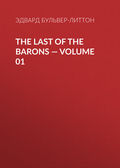
Эдвард Бульвер-Литтон
Devereux — Volume 03
"And why?" The valet explained. A relation of his was in England only for a few days: the philosopher was most anxious to enjoy his society, a pleasure which fate might not again allow him.
Though I had grown accustomed to the man's services, and did not like to lose him even for a time, yet I could not refuse his request; and I therefore ordered another of my servants to supply his place. This change, however, determined me to adopt a plan which I had before meditated; namely, the conveying of my own person to Devereux Court on horseback, and sending my servant with my luggage in my post-chaise. The equestrian mode of travelling is, indeed to this day, the one most pleasing to me; and the reader will find me pursuing it many years afterwards, and to the same spot.
I might as well observe here that I had never intrusted Desmarais—no, nor one of my own servants—with the secret of my marriage with, or my visits to, Isora. I am a very fastidious person on those matters; and of all confidants, even in the most trifling affairs, I do most eschew those by whom we have the miserable honour of being served.
In order, then, to avoid having my horse brought me to Isora's house by any of these menial spies, I took the steed which I had selected for my journey, and rode to Isora's with the intention of spending the evening there, and thence commencing my excursion with the morning light.
CHAPTER II
LOVE; PARTING; A DEATH-BED.—AFTER ALL HUMAN NATURE IS A BEAUTIFUL FABRIC; AND EVEN ITS IMPERFECTIONS ARE NOT ODIOUS TO HIM WHO HAS STUDIED THE SCIENCE OF ITS ARCHITECTURE, AND FORMED A REVERENT ESTIMATE OF ITS CREATOR
IT is a noticeable thing how much fear increases love. I mean—for the aphorism requires explanation—how much we love in proportion to our fear of losing (or even to our fear of injury done to) the beloved object. 'Tis an instance of the reaction of the feelings: the love produces the fear, and the fear reproduces the love. This is one reason, among many, why women love so much more tenderly and anxiously than we do; and it is also one reason among many why frequent absences are, in all stages of love, the most keen exciters of the passion. I never breathed, away from Isora, without trembling for her safety. I trembled lest this Barnard, if so I should still continue to call her persecutor, should again discover and again molest her. Whenever (and that was almost daily) I rode to the quiet and remote dwelling I had procured her, my heart beat so vehemently, and my agitation was so intense, that on arriving at the gate I have frequently been unable, for several minutes, to demand admittance. There was, therefore, in the mysterious danger which ever seemed to hang over Isora, a perpetual irritation to a love otherwise but little inclined to slumber; and this constant excitement took away from the torpor into which domestic affection too often languishes, and increased my passion even while it diminished my happiness.
On my arrival now at Isora's, I found her already stationed at the window, watching for my coming. How her dark eyes lit into lustre when they saw me! How the rich blood mantled up under the soft cheek which feeling had refined of late into a paler hue than it was wont, when I first gazed upon it, to wear! Then how sprang forth her light step to meet me! How trembled her low voice to welcome me! How spoke, from every gesture of her graceful form, the anxious, joyful, all-animating gladness of her heart! It is a melancholy pleasure to the dry, harsh afterthoughts of later life, to think one has been thus loved; and one marvels, when one considers what one is now, how it could have ever been! That love /of ours/ was never made for after years! It could never have flowed into the common and cold channel of ordinary affairs! It could never have been mingled with the petty cares and the low objects with which the loves of all who live long together in this sordid and most earthly earth are sooner or later blended! We could not have spared to others an atom of the great wealth of our affection. We were misers of every coin in that boundless treasury. It would have pierced me to the soul to have seen Isora smile upon another. I know not even, had we had children, if I should not have been jealous of my child! Was this selfish love? yes, it was, intensely, wholly selfish; but it was a love made so only by its excess; nothing selfish on a smaller scale polluted it. There was not on earth that which the one would not have forfeited at the lightest desire of the other. So utterly were happiness and Isora entwined together that I could form no idea of the one with which the other was not connected. Was this love made for the many and miry roads through which man must travel? Was it made for age, or, worse than age, for those cool, ambitious, scheming years that we call mature, in which all the luxuriance and verdure of things are pared into tame shapes that mimic life, but a life that is estranged from Nature, in which art is the only beauty and regularity the only grace? No, in my heart of hearts, I feel that our love was not meant for the stages of life through which I have already passed; it would have made us miserable to see it fritter itself away, and to remember what it once was. Better as it is! better to mourn over the green bough than to look upon the sapless stem. You who now glance over these pages, are you a mother? If so, answer me one question: Would you not rather that the child whom you have cherished with your soul's care, whom you have nurtured at your bosom, whose young joys your eyes have sparkled to behold, whose lightest grief you have wept to witness as you would have wept not for your own; over whose pure and unvexed sleep you have watched and prayed, and, as it lay before you thus still and unconscious of your vigil, have shaped out, oh, such bright hopes for its future lot,—would you not rather that while thus young and innocent, not a care tasted, not a crime incurred, it went down at once into the dark grave? Would you not rather suffer this grief, bitter though it be, than watch the predestined victim grow and ripen, and wind itself more and more around your heart, and when it is of full and mature age, and you yourself are stricken by years, and can form no new ties to replace the old that are severed, when woes have already bowed the darling of your hope, whom woe never was to touch, when sins have already darkened the bright, seraph, unclouded heart which sin never was to dim,—behold it sink day by day altered, diseased, decayed, into the tomb which its childhood had in vain escaped? Answer me: would not the earlier fate be far gentler than the last? And if you /have/ known and wept over that early tomb, if you have seen the infant flower fade away from the green soil of your affections; if you have missed the bounding step, and the laughing eye, and the winning mirth which made this sterile world a perpetual holiday,—Mother of the Lost, if you have known, and you still pine for these, answer me yet again! Is it not a comfort, even while you mourn, to think of all that that breast, now so silent, has escaped? The cream, the sparkle, the elixir of life, it had already quaffed: is it not sweet to think it shunned the wormwood and the dregs? Answer me, even though the answer be in tears! Mourner, your child was to you what my early and only love was to me; and could you pierce down, down through a thousand fathom of ebbing thought, to the far depths of my heart, you would there behold a sorrow /and a consolation/ that have something in unison with your own!
When the light of the next morning broke into our room, Isora was still sleeping. Have you ever observed that the young, seen asleep and by the morning light, seem much younger even than they are? partly because the air and the light sleep of dawn bring a fresher bloom to the cheek, and partly, because the careless negligence and the graceful postures exclusively appropriated to youth, are forbidden by custom and formality through the day, and developing themselves unconsciously in sleep, they strike the eye like the ease and freedom of childhood itself. There, as I looked upon Isora's tranquil and most youthful beauty, over which circled and breathed an ineffable innocence,—even as the finer and subtler air, which was imagined by those dreamy bards who kindled the soft creations of naiad and of nymph, to float around a goddess,—I could not believe that aught evil awaited one for whom infancy itself seemed to linger,—linger as if no elder shape and less delicate hue were meet to be the garment of so much guilelessness and tenderness of heart. I felt, indeed, while I bent over her, and her regular and quiet breath came upon my cheek, that feeling which is exactly the reverse to a presentiment of ill. I felt as if, secure in her own purity, she had nothing to dread, so that even the pang of parting was lost in the confidence which stole over me as I then gazed.
I rose gently, went to the next room, and dressed myself; I heard my horse neighing beneath, as the servant walked him lazily to and fro. I re-entered the bed-chamber in order to take leave of Isora; she was already up. "What!" said I, "it is but three minutes since I left you asleep, and I stole away as time does when with you."
"Ah!" said Isora, smiling and blushing too, "but for my part, I think there is an instinct to know, even if all the senses were shut up, whether the one we love is with us or not. The moment you left me, I felt it at once, even in sleep, and I woke. But you will not, no, you will not leave me yet!"
I think I see Isora now, as she stood by the window which she had opened, with a woman's minute anxiety, to survey even the aspect of the clouds, and beseech caution against the treachery of the skies. I think I see her now, as she stood the moment after I had torn myself from her embrace, and had looked back, as I reached the door, for one parting glance,—her eyes all tenderness, her lips parted, and quivering with the attempt to smile, the long, glossy ringlets (through whose raven hue the /purpureum lumen/ broke like an imprisoned sunbeam) straying in dishevelled beauty over her transparent neck; the throat bent in mute despondency; the head drooping; the arms half extended, and dropping gradually as my steps departed; the sunken, absorbed expression of face, form, and gesture, so steeped in the very bitterness of dejection,—all are before me now, sorrowful, and lovely in sorrow, as they were beheld years ago, by the gray, cold, comfortless light of morning!
"God bless you,—my own, own love," I said; and as my look lingered, I added, with a full but an assured heart; "and He will!" I tarried no more: I flung myself on my horse, and rode on as if I were speeding /to/, and not /from/, my bride.
The noon was far advanced, as, the day after I left Isora, I found myself entering the park in which Devereux Court is situated. I did not enter by one of the lodges, but through a private gate. My horse was thoroughly jaded; for the distance I had come was great, and I had ridden rapidly; and as I came into the park, I dismounted, and, throwing the rein over my arm, proceeded slowly on foot. I was passing through a thick, long plantation, which belted the park and in which several walks and rides had been cut, when a man crossed the same road which I took, at a little distance before me. He was looking on the ground, and appeared wrapt in such earnest meditation that he neither saw nor heard me. But I had seen enough of him, in that brief space of time, to feel convinced that it was Montreuil whom I beheld. What brought him hither, him, whom I believed in London, immersed with Gerald in political schemes, and for whom these woods were not only interdicted ground, but to whom they must have also been but a tame field of interest, after his audiences with ministers and nobles? I did not, however, pause to consider on his apparition; I rather quickened my pace towards the house, in the expectation of there ascertaining the cause of his visit.
The great gates of the outer court were open as usual: I rode unheedingly through them, and was soon at the door of the hall. The porter, who unfolded to my summons the ponderous door, uttered, when he saw me, an exclamation that seemed to my ear to have in it more of sorrow than welcome.
"How is your master?" I asked.
The man shook his head, but did not hasten to answer; and, impressed with a vague alarm, I hurried on without repeating the question. On the staircase I met old Nicholls, my uncle's valet; I stopped and questioned him. My uncle had been seized on the preceding day with gout in the stomach; medical aid had been procured, but it was feared ineffectually, and the physicians had declared, about an hour before I arrived, that he could not, in human probability, outlive the night. Stifling the rising at my heart, I waited to hear no more: I flew up the stairs; I was at the door of my uncle's chamber; I stopped there, and listened; all was still; I opened the door gently; I stole in, and, creeping to the bedside, knelt down and covered my face with my hands; for I required a pause for self-possession, before I had courage to look up. When I raised my eyes, I saw my mother on the opposite side; she sat on a chair with a draught of medicine in one hand, and a watch in the other. She caught my eye, but did not speak; she gave me a sign of recognition, and looked down again upon the watch. My uncle's back was turned to me, and he lay so still that, for some moments, I thought he was asleep; at last, however, he moved restlessly.
"It is past noon!" said he to my mother, "is it not?"
"It is three minutes and six seconds after four," replied my mother, looking closer at the watch.
My uncle sighed. "They have sent an express for the dear boy, Madam?" said he.
"Exactly at half-past nine last evening," answered my mother, glancing at me.
"He could scarcely be here by this time," said my uncle, and he moved again in the bed. "Pish, how the pillow frets one!"
"Is it too high?" said my mother.
"No," said my uncle, faintly, "no—no—the discomfort is not in the pillow, after all: 'tis a fine day; is it not?"
"Very!" said my mother; "I wish you could go out."
My uncle did not answer: there was a pause. "Ods fish, Madam, are those carriage wheels?"
"No, Sir William—but—"
"There /are/ sounds in my ear; my senses grow dim," said my uncle, unheeding her: "would that I might live another day; I should not like to die without seeing him. 'Sdeath, Madam, I do hear something behind!—Sobs, as I live!—Who sobs for the old knight?" and my uncle turned round, and saw me.
"My dear—dear uncle!" I said, and could say no more.
"Ah, Morton," cried the kind old man, putting his hand affectionately upon mine. "Beshrew me, but I think I have conquered the grim enemy now that you are come. But what's this, my boy?—tears—tears,—why, little Sid—no, nor Rochester either, would ever have believed this if I had sworn it! Cheer up, cheer up."
But, seeing that I wept and sobbed the more, my uncle, after a pause, continued in the somewhat figurative strain which the reader has observed he sometimes adopted, and which perhaps his dramatic studies had taught him.
"Nay, Morton, what do you grieve for?—that Age should throw off its fardel of aches and pains, and no longer groan along its weary road, meeting cold looks and unwilling welcomes, as both host and comrade grow weary of the same face, and the spendthrift heart has no longer quip or smile wherewith to pay the reckoning? No, no: let the poor pedler shuffle off his dull pack, and fall asleep. But I am glad you are come: I would sooner have one of your kind looks at your uncle's stale saws or jests than all the long faces about me, saving only the presence of your mother;" and with his characteristic gallantry, my uncle turned courteously to her.
"Dear Sir William!" said she, "it is time you should take your draught; and then would it not be better that you should see the chaplain? he waits without."
"Ods fish," said my uncle, turning again to me, "'tis the way with them all: when the body is past hope comes the physician, and when the soul is past mending comes the priest. No, Madam, no, 'tis too late for either.—Thank ye, Morton, thank ye" (as I started up—took the draught from my mother's hand, and besought him to drink it), "'tis of no use; but if it pleases thee, I must,"—and he drank the medicine.
My mother rose, and walked towards the door: it was ajar; and, as my eye followed her figure, I perceived, through the opening, the black garb of the chaplain.
"Not yet," said she, quietly; "wait." And then gliding away, seated herself by the window in silence, and told her beads.
My uncle continued: "They have been at me, Morton, as if I had been a pagan; and I believe, in their hearts, they are not a little scandalized that I don't try to win the next world by trembling like an ague. Faith now, I never could believe that Heaven was so partial to cowards; nor can I think, Morton, that Salvation is like a soldier's muster-roll, and that we may play the devil between hours, so that, at the last moment, we whip in, and answer to our names. Ods fish, Morton, I could tell thee a tale of that; but 'tis a long one, and we have not time now. Well, well, for my part, I deem reverently and gratefully of God, and do not believe He will be very wroth with our past enjoyment of life, if we have taken care that others should enjoy it too; nor do I think, with thy good mother, and Aubrey, dear child! that an idle word has the same weight in the Almighty's scales as a wicked deed."
"Blessed, blessed, are they," I cried through my tears, "on whose souls there is as little stain as there is on yours!"
"Faith, Morton, that's kindly said; and thou knowest not how strangely it sounds, after their exhortations to repentance. I know I have had my faults, and walked on to our common goal in a very irregular line; but I never wronged the living nor slandered the dead, nor ever shut my heart to the poor,—'t were a burning sin if I had,—and I have loved all men and all things, and I never bore ill-will to a creature. Poor Ponto, Morton, thou wilt take care of poor Ponto, when I'm dead,—nay, nay, don't grieve so. Go, my child, go: compose thyself while I see the priest, for 't will please thy poor mother; and though she thinks harshly of me now, I should not like her to do so /to-morrow/! Go, my dear boy, go."
I went from the room, and waited by the door, till the office of the priest was over. My mother then came out, and said Sir William had composed himself to sleep. While she was yet speaking, Gerald surprised me by his appearance. I learned that he had been in the house for the last three days, and when I heard this, I involuntarily accounted for the appearance of Montreuil. I saluted him distantly, and he returned my greeting with the like pride. He seemed, however, though in a less degree, to share in my emotions; and my heart softened to him for it. Nevertheless we stood apart, and met not as brothers should have met by the death-bed of a mutual benefactor.
"Will you wait without?" said my mother.
"No," answered I, "I will watch over him." So I stole in, with a light step, and seated myself by my uncle's bed-side. He was asleep, and his sleep was as hushed and quiet as an infant's. I looked upon his face, and saw a change had come over it, and was increasing sensibly: but there was neither harshness nor darkness in the change, awful as it was. The soul, so long nurtured on benevolence, could not, in parting, leave a rude stamp on the kindly clay which had seconded its impulses so well.
The evening had just set in, when my uncle woke; he turned very gently, and smiled when he saw me.
"It is late," said he, and I observed with a wrung heart, that his voice was fainter.
"No, Sir, not very," said I.
"Late enough, my child; the warm sun has gone down; and 'tis a good time to close one's eyes, when all without looks gray and chill: methinks it is easier to wish thee farewell, Morton, when I see thy face indistinctly. I am glad I shall not die in the daytime. Give me thy hand, my child, and tell me that thou art not angry with thine old uncle for thwarting thee in that love business. I have heard tales of the girl, too, which made me glad, for thy sake, that it is all off, though I might not tell thee of them before. 'Tis very dark, Morton. I have had a pleasant sleep. Ods fish, I do not think a bad man would have slept so well. The fire burns dim, Morton: it is very cold. Cover me up; double the counterpane over the legs, Morton. I remember once walking in the Mall; little Sid said, 'Devereux'—it is colder and colder, Morton; raise the blankets more over the back; 'Devereux,' said little Sid—faith, Morton, 'tis ice now—where art thou?—is the fire out, that I can't see thee? Remember thine old uncle, Morton—and— and—don't forget poor—Ponto. Bless thee, my child; bless you all!"
And my uncle died!







